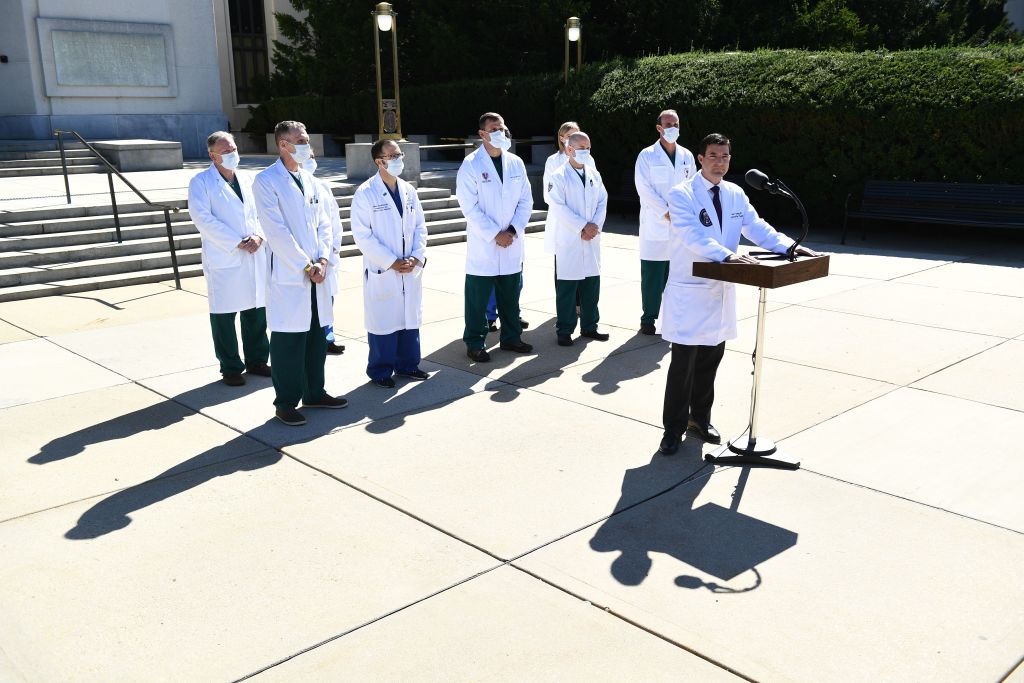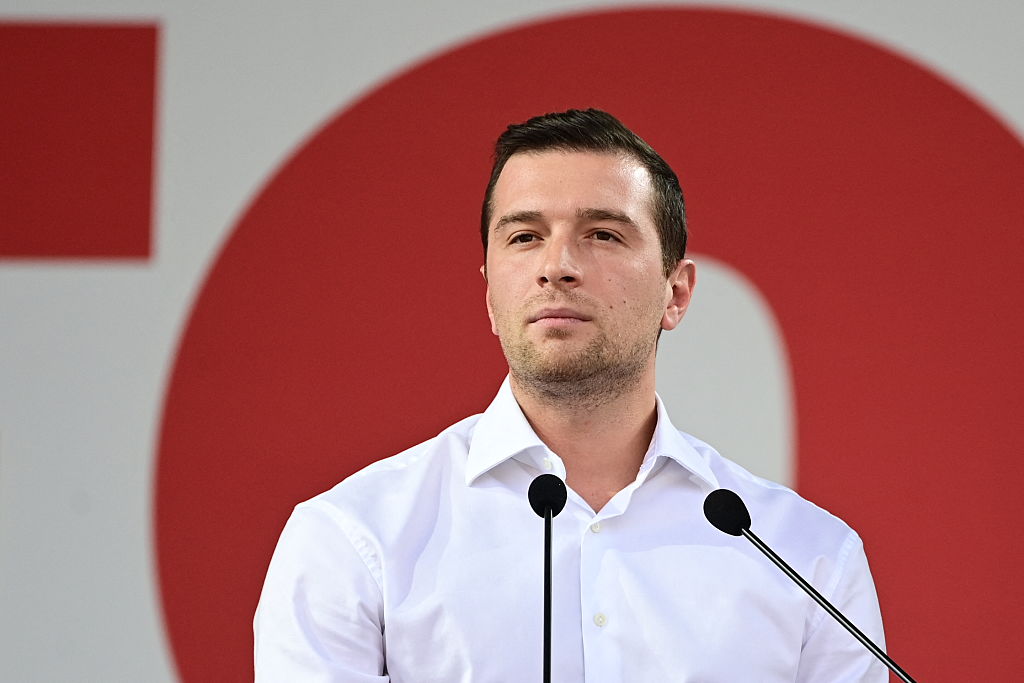What’s the most important part of this developing Trump-has-COVID story? Is it ‘how sick is the President?’ Or is it ‘look at journalists trying to find out how sick the President is?’ It can be hard to tell.
Saturday was the day of the ‘mixed messages’. At a press briefing, the physicians delivered what was meant to be an upbeat assessment of Trump’s condition. The President had been fever free for 24 hours; his symptoms were ‘resolving and improving’. Then came the questions and the answers became confusing. Dr Sean Conley, the incumbent physician to the President, became evasive when asked if Trump had been given oxygen. It turns out he had. The briefing also led to some confusion over when exactly the President had started to feel unwell.
Then came the Mark Meadows sideshow. The White House Chief of Staff got caught out briefing reporters that the actual situation was ‘very concerning’. Silly Mark. He later went on Fox to clarify that Trump had made ‘unbelievable improvements since yesterday morning’ even though he was not ‘out of the woods’. Which is a bit odd because Meadows had given a briefing outside the White House that morning in which he described Trump’s symptoms as mild and said he was in ‘not only in good spirits but very energetic.’
It was confusing. So, without much solid information to go on, Washington’s journalists did what they do best. They talked about themselves. Jonathan Swan, the big scoop-getter at Axios, started telling us about how hard he was working.
He also wrote a short piece, ‘Covering a Cover Up’, which was a sort of masterpiece of clickable ego-driven 21st-century reportage. It’s worth quoting at length:
‘What is the actual state of President Trump’s health — now and over the past 24 hours?
‘Why it matters: It’s one of the most high-stakes questions in the world, and I cannot answer it, despite having spent since 5 a.m. on Friday on my phone with sources inside and close to the White House.
‘On Friday night, we chose not to publish information we’d learned from well-placed sources who told us the President had experienced a fever and was worse than the White House was letting on.
‘We chose not to publish because we weren’t certain enough it was correct, and it was no time to lower our editorial standards.
The message: don’t for one moment think that we at Axios aren’t very good at our jobs. It’s only our professionalism that stopped us from breaking a major story. Better late than wrong etc etc.
On Twitter, the blue-check back-slapping began. Journalists told each other what professionals they have been while dealing with an incoherent White House. Maggie Haberman of the New York Times praised Swan’s piece. Swan for his part said: ‘The last 24 hours is more evidence why Maggie Haberman is the best reporter covering the Trump White House.’
Meanwhile, Tim Alberta, the chief political correspondent at Politico, told ‘all you youngsters out there… this is called Journalism 101. Free lesson from professor @jonathanvswan >>’
All you youngsters out there… this is called Journalism 101. Free lesson from professor @jonathanvswan >>https://t.co/ys8KmM6ULs pic.twitter.com/MQd5qHgjaa
— Tim Alberta (@TimAlberta) October 4, 2020
Alberta is a magnanimous fellow. Faced with this major story of a sick president in hospital with just a month to go before the election, he seems to have decided his duty is not to cover himself in byline glory. It is to educate his lessers on the principles of sound journalism through the medium of Twitter.
BTW — the media's credibility is essential right now, too.
No speculation. No single-sourcing. Get corroborations and confirmations before publishing sensitive information. The world will remember mistakes. https://t.co/1xhpihr9Xp
— Tim Alberta (@TimAlberta) October 2, 2020
He then got irate at Sara Cook of CBS’s tweeting of Mark Meadows ‘concerning’ statement without attribution.
????????????
Hell no. Put a name on this. Anonymity is not acceptable. https://t.co/HgeV1JZEBL
— Tim Alberta (@TimAlberta) October 3, 2020
You cannot issue a blind quote contradicting a briefing by the president's doctor while the president is hospitalized with a life-threatening illness.
If I'm in the pool, I'm telling the source they have 10 minutes to put their name on that statement, or else they will be outed. https://t.co/tGByJufKG8
— Tim Alberta (@TimAlberta) October 3, 2020
Listen, we all who know who the source is. This ain't rocket science; there's only one WH official at Walter Reed. It's unfathomable why pool reporters would agree to keep this on background. https://t.co/kCXQVcvp4D
— Tim Alberta (@TimAlberta) October 3, 2020
You have to admire anyone who starts a tweet with ‘Listen’. Oh we’re listening, Tim: give us more of your pearls! Wait, you already are…
This is the problem w/ giving anonymity to a source at a time of crisis to contradict what was said on the record—we don't know the source's motivation.
Does he want the public to know the truth? Does he see political advantage in building suspense? Does he want to box in POTUS? https://t.co/UkSVdJ0hS0
— Tim Alberta (@TimAlberta) October 3, 2020
At which point Oliver Darcy of CNN, who is at least a ‘media reporter’ chipped in with:
It would also be helpful if the pool explained why the source requested / demanded to be anonymous. That info was not provided when the quote was sent out. Moreover, it'd be good to know if the pool aggressively pushed back on the info being given on condition of anonymity.
— Oliver Darcy (@oliverdarcy) October 3, 2020
Thanks Oliver. One can’t help wondering: if these journos spent more time digging and less applauding themselves on Twitter, they might be better able to stand up the stories they’ll later insist they already knew. Or how about they spend less time discussing their craft and more time crafting? Just a thought.
[special_offer]
Yes, the White House’s communications in recent days have been muddling and perhaps deceptive. That isn’t all that surprising. An arguably bigger problem is that the media has become so implacably narcissistic that it can’t stop talking about itself even when the leader of the free world is in hospital. Blame Twitter, I suppose.

























